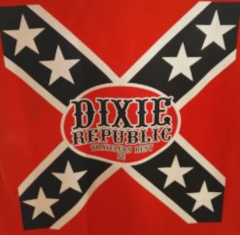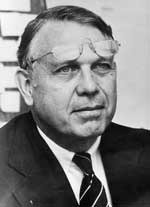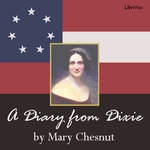A Diary From Dixie, Chapter 05
V. MONTGOMERY, ALA.
April 27, 1861 - May 20, 1861
MONTGOMERY, Ala., April 27, 1861. - Here we are once more. Hon. Robert Barnwell came with us. His benevolent spectacles give him a most Pickwickian expression. We Carolinians revere his goodness above all things. Everywhere, when the car stopped, the people wanted a speech, and we had one stream of fervid oratory. We came along with a man whose wife lived in Washington. He was bringing her to Georgia as the safest place.
The Alabama crowd are not as confident of taking Fort Pickens as we were of taking Fort Sumter.
Baltimore is in a blaze. They say Colonel Ben Huger is in command there - son of the "Olmutz" Huger. General Robert E. Lee, son of Light Horse Harry Lee, has been made General-in-Chief of Virginia. With such men to the fore, we have hope. The New York Herald says, "Slavery must be extinguished, if in blood." It thinks we are shaking in our shoes at their great mass meetings. We are jolly as larks, all the same.
Mr. Chesnut has gone with Wade Hampton 1 to see President Davis about the legion Wade wants to get up.
1. Wade Hampton was a son of another Wade Hampton, who was an aide to General Jackson at the battle of New Orleans, and a grandson of still another Wade Hampton, who was a general in the Revolution. He was not in favor of secession, but when the war began he enlisted as a private and then raised a command of infantry, cavalry, and artillery, which as "Hampton's Legion" won distinction in the war. After the war, he was elected Governor of South Carolina and was then elected to the United States Senate.
The President came across the aisle to speak to me at church to-day. He was very cordial, and I appreciated the honor.
Wigfall is black with rage at Colonel Anderson's account of the fall of Sumter. Wigfall did behave magnanimously, but Anderson does not seem to see it in that light. "Catch me risking my life to save him again," says Wigfall. "He might have been man enough to tell the truth to those New Yorkers, however unpalatable to them a good word for us might have been. We did behave well to him. The only men of his killed, he killed himself, or they killed themselves firing a salute to their old striped rag."
Mr. Chesnut was delighted with the way Anderson spoke to him when he went to demand the surrender. They parted quite tenderly. Anderson said: "If we do not meet again on earth, I hope we may meet in Heaven." How Wigfall laughed at Anderson "giving Chesnut a howdy in the other world!"
What a kind welcome the old gentlemen gave me! One, more affectionate and homely than the others, slapped me on the back. Several bouquets were brought me, and I put them in water around my plate. Then General Owens gave me some violets, which I put in my breastpin.
"Oh," said my "Gutta Percha" Hemphill,1 "if I had known how those bouquets were to be honored I would have been up by daylight seeking the sweetest flowers!" Governor Moore came in, and of course seats were offered him. "This is a most comfortable chair," cried an overly polite person. "The most comfortable chair is beside Mrs. Chesnut," said the Governor, facing the music gallantly, as he sank into it gracefully. Well done, old fogies!
1. John Hemphill was a native of South Carolina, who had removed to Texas, where he became Chief Justice of the Supreme Court of the State, and in 1858 was elected United States Senator.
Browne said: "These Southern men have an awfully flattering Way with women." "Oh, so many are descendants of Irishmen, and so the blarney remains yet, even and in spite of their gray hairs!" For it was a group of silver-gray flatterers. Yes, blarney as well as bravery came in with the Irish.
At Mrs. Davis's reception dismal news, for civil war seems certain. At Mrs. Toombs's reception Mr. Stephens came by me. Twice before we have had it out on the subject of this Confederacy, once on the cars, coming from Georgia here, once at a supper, where he sat next to me. To-day he was not cheerful in his views. I called him half-hearted, and accused him of looking back. Man after man came and interrupted the conversation with some frivle-fravle, but we held on. He was deeply interesting, and he gave me some new ideas as to our dangerous situation. Fears for the future and not exultation at our successes pervade his discourse.
Dined at the President's and never had a pleasanter day. He is as witty as he is wise. He was very agreeable; he took me in to dinner. The talk was of Washington; nothing of our present difficulties.
A General Anderson from Alexandria, D. C., was in doleful dumps. He says the North are so much better prepared than we are. They are organized, or will be, by General Scott. We are in wild confusion. Their army is the best in the world. We are wretchedly armed, etc., etc. They have ships and arms that were ours and theirs.
Mrs. Walker, resplendently dressed, one of those gorgeously arrayed persons who fairly shine in the sun, tells me she mistook the inevitable Morrow for Mr. Chesnut, and added, "Pass over the affront to my powers of selection." I told her it was "an insult to the Palmetto flag." Think of a South Carolina Senator like that!
Men come rushing in from Washington with white lips, crying, "Danger, danger!" It is very tiresome to have
these people always harping on this: "The enemy's troops are the finest body of men we ever saw." "Why did you not make friends of them," I feel disposed to say. We would have war, and now we seem to be letting our golden opportunity pass; we are not preparing for war. There is talk, talk, talk in that Congress - lazy legislators, and rash, reckless, headlong, devil-may-care, proud, passionate, unruly, raw material for soldiers. They say we have among us a regiment of spies, men and women, sent here by the wily Seward. Why? Our newspapers tell every word there is to be told, by friend or foe.
A two-hours' call from Hon. Robert Barnwell. His theory is, all would have been right if we had taken Fort Sumter six months ago. He made this very plain to me. He is clever, if erratic. I forget why it ought to have been attacked before. At another reception, Mrs. Davis was in fine spirits. Captain Dacier was here. Came over in his own yacht. Russell, of The London Times, wondered how we had the heart to enjoy life so thoroughly when all the Northern papers said we were to be exterminated in such a short time.
May 9th. - Virginia Commissioners here. Mr. Staples and Mr. Edmonston came to see me. They say Virginia "has no grievance; she comes out on a point of honor; could she stand by and see her sovereign sister States invaded?"
Sumter Anderson has been offered a Kentucky regiment. Can they raise a regiment in Kentucky against us? In Kentucky, our sister State?
Suddenly General Beauregard and his aide (the last left him of the galaxy who surrounded him in Charleston), John Manning, have gone - Heaven knows where, but out on a war-path certainly. Governor Manning called himself "the last rose of summer left blooming alone" of that fancy staff. A new fight will gather them again.
Ben McCulloch, the Texas Ranger, is here, and Mr.
Ward,1 my "Gutta Percha" friend's colleague from Texas. Senator Ward in appearance is the exact opposite of Senator Hemphill. The latter, with the face of an old man, has the hair of a boy of twenty. Mr. Ward is fresh and fair, with blue eyes and a boyish face, but his head is white as snow. Whether he turned it white in a single night or by slower process I do not know, but it is strangely out of keeping with his clear young eye. He is thin, and has a queer stooping figure.
This story he told me of his own experience. On a Western steamer there was a great crowd and no unoccupied berth, or sleeping place of any sort whatsoever in the gentlemen's cabin - saloon, I think they called it. He had taken a stateroom, 110, but he could not eject the people who had already seized it and were asleep in it. Neither could the Captain. It would have been a case of revolver or " 'leven inch Bowie-knife."
Near the ladies' Saloon the steward took pity on him. "This man," said he, "is 110, and I can find no place for him, poor fellow." There was a peep out of bright eyes: "I say, steward, have you a man 110 years old out there? Let us see him. He must be a natural curiosity." "We are overcrowded," was the answer, "and we can't find a place for him to sleep." "Poor old soul; bring him in here. We will take care of him."
"Stoop and totter," sniggered the steward to No. 110, "and go in."
"Ah," said Mr. Ward, "how those houris patted and pitied me and hustled me about and gave me the best berth! I tried not to look; I knew it was wrong, but I looked. I saw them undoing their back hair and was lost in amazement
1. Matthias Ward was a native of Georgia, but had removed to Texas in 1836, He was twice a delegate to National Democratic Conventions, and in 1858 was appointed to fill a vacancy from Texas in the United States Senate, holding that office until 1860.
at the collapse when the huge hoop-skirts fell off, unheeded on the cabin floor."
One beauty who was disporting herself near his curtain suddenly caught his eye. She stooped and gathered up her belongings as she said: "I say, stewardess, your old hundred and ten is a humbug. His eyes are too blue for anything," and she fled as he shut himself in, nearly frightened to death. I forget how it ended. There was so much laughing at his story I did not hear it all. So much for hoary locks and their reverence-inspiring power!
Russell, the wandering English newspaper correspondent, was telling how very odd some of our plantation habits were. He was staying at the house of an ex-Cabinet Minister, and Madame would stand on the back piazza and send her voice three fields off, calling a servant. Now that is not a Southern peculiarity. Our women are soft, and sweet, low-toned, indolent, graceful, quiescent. I dare say there are bawling, squalling, vulgar people everywhere.
May 13th. - We have been down from Montgomery on the boat to that God-forsaken landing, Portland, Ala. Found everybody drunk - that is, the three men who were there. At last secured a carriage to carry us to my brother-in-law's house. Mr. Chesnut had to drive seven miles, pitch dark, over an unknown road. My heart was in my mouth, which last I did not open.
Next day a patriotic person informed us that, so great was the war fever only six men could be found in Dallas County. I whispered to Mr. Chesnut: "We found three of the lone ones hors de combat at Portland." So much for the corps of reserves - alcoholized patriots.
Saw for the first time the demoralization produced by hopes of freedom. My mother's butler (whom I taught to read, sitting on his knife-board) contrived to keep from speaking to us. He was as efficient as ever in his proper place, but he did not come behind the scenes as usual and have a friendly chat. Held himself aloof so grand and
stately we had to send him a "tip" through his wife Hetty, mother's maid, who, however, showed no signs of disaffection. She came to my bedside next morning with everything that was nice for breakfast. She had let me sleep till midday, and embraced me over and over again. I remarked: "What a capital cook they have here!" She curtsied to the ground. "I cooked every mouthful on that tray - as if I did not know what you liked to eat since you was a baby."
May 19th. - Mrs. Fitzpatrick says Mr. Davis is too gloomy for her. He says we must prepare for a long war and unmerciful reverses at first, because they are readier for war and so much stronger numerically. Men and money count so in war. "As they do everywhere else," said I, doubting her accurate account of Mr. Davis's spoken words, though she tried to give them faithfully. We need patience and persistence. There is enough and to spare of pluck and dash among us, the do-and-dare style.
I drove out with Mrs. Davis. She finds playing Mrs. President of this small confederacy slow work, after leaving friends such as Mrs. Emory and Mrs. Joe Johnston1 in Washington. I do not blame her. The wrench has been awful with us all, but we don't mean to be turned into pillars of salt.
Mr. Mallory came for us to go to Mrs. Toombs's reception. Mr. Chesnut would not go, and I decided to remain with him. This proved a wise decision. First Mr. Hunter2
1. Mrs. Johnston was Lydia McLane, a daughter of Louis McLane, United States Senator from Delaware from 1827 to 1829, and afterward Minister to England. In 1831 he became Secretary of the Treasury and in 1833 Secretary of State. General Joseph E. Johnston was graduated from West Point in 1829 and had served in the Black Hawk, Seminole, and Mexican Wars. He resigned his commission in the United States Army on April 22, 1861.
2. Mr. Hunter was a Virginian. He had long served in Congress, was twice speaker of the House, and in 1844 was elected a United States Senator, serving until 1861. He supported slavery and became active in the secession movement. At the Charleston Convention in 1860, he received the next highest vote to Stephen A. Douglas for President.
came. In college they called him from his initials, R. M. T., "Run Mad Tom" Hunter. Just now I think he is the sanest, if not the wisest, man in our new-born Confederacy. I remember when I first met him. He sat next to me at some state dinner in Washington. Mr. Clay had taken me in to dinner, but seemed quite satisfied that my "other side" should take me off his hands.
Mr. Hunter did not know me, nor I him. I suppose he inquired, or looked at my card, lying on the table, as I looked at his. At any rate, we began a conversation which lasted steadily through the whole thing from soup to dessert. Mr. Hunter, though in evening dress, presented a rather tumbled-up appearance. His waistcoat wanted pulling down, and his hair wanted brushing. He delivered unconsciously that day a lecture on English literature which, if printed, I still think would be a valuable addition to that literature. Since then, I have always looked forward to a talk with the Senator from Virginia with undisguised pleasure. Next came Mr. Miles and Mr. Jameson, of South Carolina. The latter was President of our Secession Convention; also has written a life of Du Guesclin that is not so bad. So my unexpected reception was of the most charming. Judge Frost came a little later. They all remained until the return of the crowd from Mrs. Toombs's.
These men are not sanguine - I can't say, without hope, exactly. They are agreed in one thing: it is worth while to try a while, if only to get away from New England. Captain Ingraham was here, too. He is South Carolina to the tips of his fingers; yet he has it dyed in the wool - it is part of his nature - to believe the United States Navy can whip anything in the world. All of these little inconsistencies and contrarieties make the times very exciting. One
never knows what tack any one of them will take at the next word.
May 20th. - Lunched at Mrs. Davis's; everything nice to eat, and I was ravenous. For a fortnight I have not even gone to the dinner table. Yesterday I was forced to dine on cold asparagus and blackberries, so repulsive in aspect was the other food they sent me. Mrs. Davis was as nice as the luncheon. When she is in the mood, I do not know so pleasant a person. She is awfully clever, always.
We talked of this move from Montgomery. Mr. Chesnut opposes it violently, because this is so central a position for our government. He wants our troops sent into Maryland in order to make our fight on the border, and so to encompass Washington. I see that the uncomfortable hotels here will at last move the Congress. Our statesmen love their ease, and it will be hot here in summer. "I do hope they will go," Mrs. Davis said. "The Yankees will make it hot for us, go where we will, and truly so if war comes." "And it, has come," said I. "Yes, I fancy these dainty folks may live to regret losing even the fare of the Montgomery hotels." "Never."
Mr. Chesnut has three distinct manias. The Maryland scheme is one, and he rushes off to Jeff Davis, who, I dare say, has fifty men every day come to him with infallible plans to save the country. If only he can keep his temper. Mrs. Davis says he answers all advisers in softly modulated, dulcet accents.
What a rough menagerie we have here. And if nice people come to see you, up walks an irate Judge, who engrosses the conversation and abuses the friends of the company generally; that is, abuses everybody and prophesies every possible evil to the country, provided he finds that denouncing your friends does not sufficiently depress you. Everybody has manias - up North, too, by the papers.
But of Mr. Chesnut's three crazes: Maryland is to be made the seat of war, old Morrow's idea of buying up
steamers abroad for our coast defenses should be adopted, and, last of all, but far from the least, we must make much cotton and send it to England as a bank to draw on. The very cotton we have now, if sent across the water, would be a gold mine to us.











